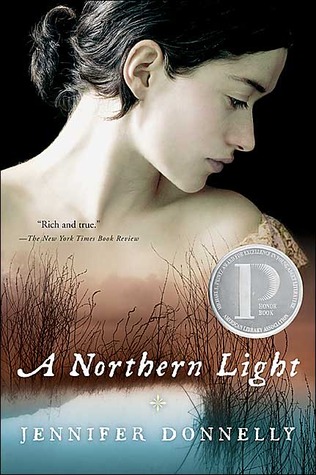Historical Fiction Done Right - A Northern Light by Jennifer Donnelly
I've been doing a lot of reading lately that doesn't really feel necessitates a formal review. This is partially because I intentionally don't read all books with reviewing in mine. When I plan on reviewing a book, I stop, take notes, highlight, all that stuff. At the pace I read, that's overwhelming to do that for each and every book.
However, sometimes I still want to share my thoughts on some of these books.
That's the long way of my saying that this isn't a "review" of Jennifer Donnelly's A Northern Light. Instead, it's more a few impressions of why this historical novel worked for me when so many others have not.
The crux of the story set in 1906 upstate New York (around Utica and Cortland, in the Adirondacks) and centers around two converging stories. The first is 16-year old Mattie's life on a farm, where her aspirations of a bookish life and college in New York City collide with the economic realities of caring for her sisters and helping her father on the farm, as well as the expectations for a girl her age to marry and establish a household. The second story is a mystery around the death of young woman staying at the hotel where Mattie works who's body is found in the lake. (This is drawn from real events, and also inspired the Book An American Tragedy and the film A Place in the Sun.)
A number of things distinguished A Northern Light for me, but the aspect that stands out the most is the approach to placing the novel in its historical context.
Donnelly's approach to the turn-of-the century setting is akin to the world-building approach seen in excellent urban fantasy-type fiction. This historical details slowly unfold so the reader understand what Mattie's life is in like on the farm (the preciousness of milk stuck with me), the role of women in this time period and the constraints on their options in life and the injustice of racism.
Never is there an "info-dump" in A Northern Light, never does a character pop in to helpfully explain why something is the way it is. Seeing the world through Mattie's eyes, an understanding of her world evolves. So often when I read historical fiction I find myself bored because of chapters and chapters of historical exposition, because I studied so much history in college and grad school, that sort of technique frustrates me because it's like reading poorly-developed non-fiction, which I do not want in my novels. I know that sounds harsh, but c'est la vie.
I also loved that Mattie felt truly like a person of her time.
Sometimes with historical fiction it seems that the main character is an incredibly "special" character so outside of her own time, I find it hard to fully believe. In A Northern Light, Mattie is firmly rooted in her time. The tension she wrestles with--to stay and do what's expected or to leave and pursue her dreams--is obviously a universal one, but it's also far harder because of the limits on her not only because she's female (this is a time period in which women could be institutionalized by their husbands for writing poetry, the threat faced by a secondary character in A Northern Light), but also because of her socio-economic status. Either choice she makes means that Mattie has a hard, hard road ahead of her regardless of the path she chooses.
Which brings me to the final thing that really resonated with me: the absolutely perfect ending.
I won't spoil it for anyone who hasn't read A Northern Light, but the final chapter (and paragraph) is one of my favorite book endings pretty much ever. I listened to the audiobook edition of this one (which I recommend highly--and Laura listened to it recently and equally enjoyed it), and had tears running down my face while driving my car as the narrator read the final lines. It's got a great payoff and is incredibly satisfying.
Have you read A Northern Light? Did it stand out to you as a head above most historical fiction?

Review: Oath Bound (Unbound #3) by Rachel Vincent







